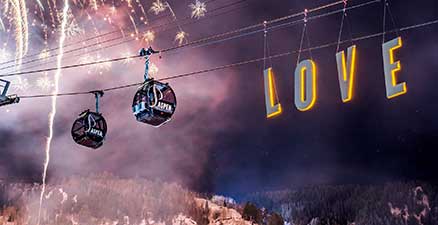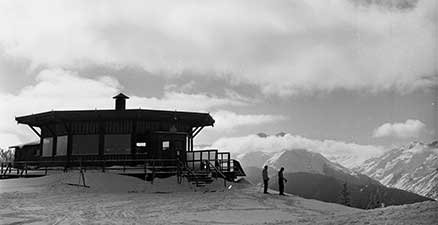Aspen Snowmass celebrates International Women’s Day on Friday, March 8 with a ski parade on Aspen Mountain. Open to everyone, the event begins at 2 PM at the top of the mountain, with the procession to the base led by female leaders at Aspen Skiing Company. The parade route follows all blue trails: Silver Bell to Spar Gulch to Little Nell.
Celebrating The Women Who Shaped Aspen Snowmass
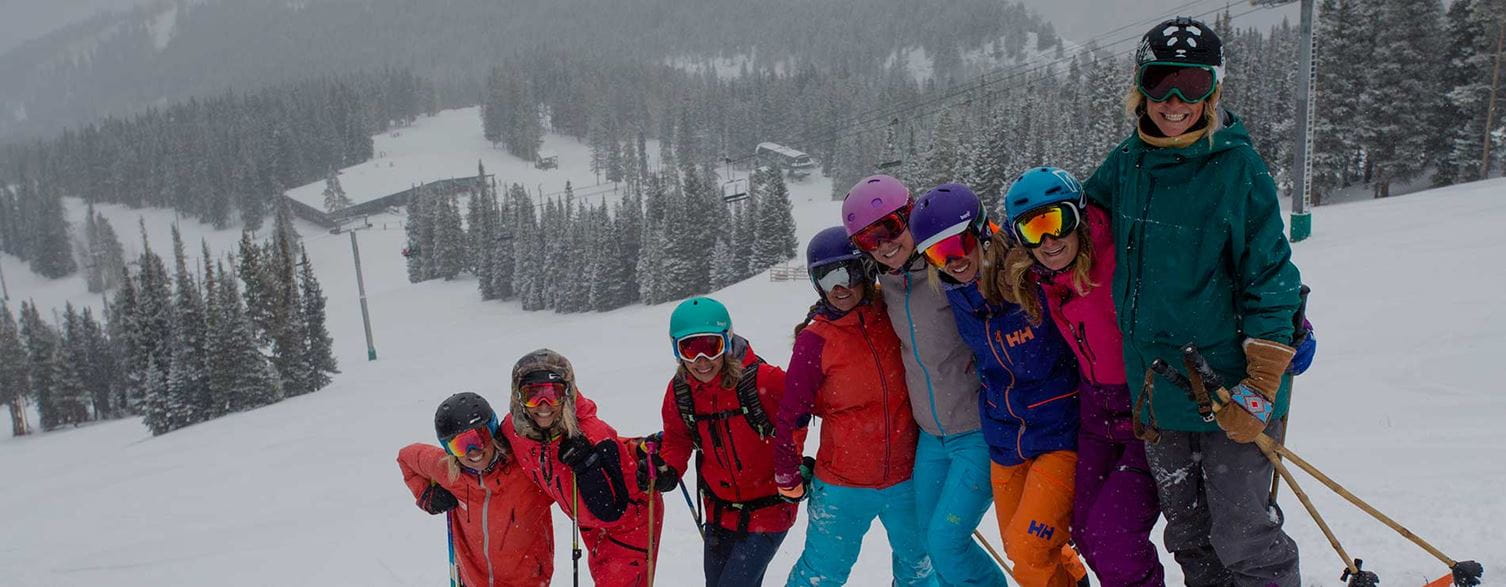
If it hadn’t been for a 1939 visit to a very sleepy Aspen by Chicago philanthropist Elizabeth Paepcke, Aspen Snowmass may not have become the world-class ski and cultural destination it is today. As we approach International Women’s Day on March 8 (see below for how to celebrate it in Aspen), it’s worth recognizing a few of the visionary women — there are too many to list — who have helped shape Aspen (and beyond) over the decades. We spoke to one of them, our very own Katie Ertl, to find out what makes a leader tick.
Elizabeth Paepcke
When Paepcke, wife of Chicago industrialist Walter Paepcke and an artist and cultural patron in her own right, first came to Aspen on a pre-World War II ski trip with friends, something struck her about the isolated former mining town that was just starting to embrace this new winter sport. She couldn’t get Aspen’s potential out of her mind, and after the war ended in 1945, convinced her husband to see it for himself. The couple bought a house on their second day in town, and in a flurry of activity over the next few years, launched the institutions — including the Aspen Music Festival, Aspen Institute, International Design Conference, and Aspen Skiing Corporation (now Aspen Skiing Company) — that would establish Aspen as the country’s preeminent retreat for the body, mind, and spirit.
The Aspen Idea was born.
The Aspen Idea was born.
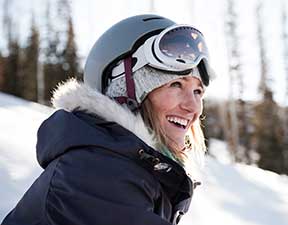
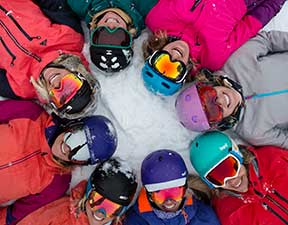
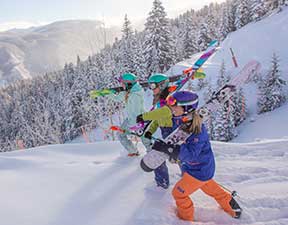
Eve Homeyer
By the time Eve Homeyer was elected as Aspen’s first female mayor in 1969, the town’s cachet was rising, along with plenty of development. Concerns over losing green areas had prompted Homeyer to run, and under her four-year tenure, Aspen’s now robust open space program got off the ground, preserving hundreds of acres in perpetuity, as did a funding stream for free mass transit. Homeyer was also a co-founder of the organization that would become Aspen Valley Land Trust.
Gretchen Bleiler
Raised on the slopes of Aspen Snowmass and influenced by the Aspen Idea, superstar snowboarder Gretchen Bleiler wasn’t content to rest on her considerable athletic laurels, which include a silver in halfpipe at the 2006 Torino Olympics and five Winter X Games podiums — four of them gold. While still busy competing, she began designing environmentally friendly women’s ski and snowboard clothing, launched the ALEX sustainable water bottle company with husband Chris Hotell, and got involved in climate change activism. Now, she uses her considerable voice on behalf of the environment, working with POW (Protect Our Winters), lobbying on Capitol Hill, and speaking at events ranging from school assemblies to the UN Climate Conference in Paris.
Katie Ertl
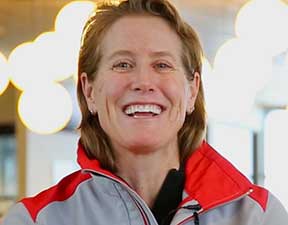
Lifetime local Katie Ertl started teaching skiing to pay her way through college at the University of Colorado, Boulder. Today, she’s senior vice president of mountain operations at Aspen Skiing Company. And as one of the few women in the upper echelons of management at a mountain resort, Ertl is uniquely positioned to shape the future of not only Aspen Snowmass but the ski industry itself.
In 1999, Ertl “tripped and stumbled” into a management position, overseeing the Aspen Highlands and Buttermilk ski schools. “I found that I loved supporting others in teaching skiing, and figuring out systems we could put in place to do even better,” she says.
In 1999, Ertl “tripped and stumbled” into a management position, overseeing the Aspen Highlands and Buttermilk ski schools. “I found that I loved supporting others in teaching skiing, and figuring out systems we could put in place to do even better,” she says.
Ertl was formative in growing the Ski and Snowboard Schools of Aspen Snowmass, and became its managing director in 2005, overseeing 1,100 instructors. In that role for 12 years, she took it upon herself to constantly learn: learn to manage and foster relations, learn new skills, and learn a lot about emotional intelligence, empathy, and compassion.
Tapped to head up mountain operations in 2017, Ertl found herself in a division that’s even more male dominated. And while she feels it’s important to strike a better gender balance in her field, she doesn’t have all the answers about how to get there. Noting that just three of the 52 applicants for two mountain manager positions recently were women, Ertl points out that part of the challenge is attracting more female applicants, but not just hiring quotas.
“It’s going to take a big shift in our biases to figure out what’s possible,” she says.
Aspen Skiing Company recently launched a humanity board to address diversity issues and figure out what could be done better in hiring and promoting a more diverse staff, Ertl explained. Meanwhile, she has taken seriously the responsibility of being a female role model, and is watching and learning from several female mentors (and some male ones, too).
And it may just be that her natural enthusiasm, and her proven ability to get the job done, will move things forward.
Asked how she’d encourage other women to reach for the stars, Ertl responded, “What’s the worst thing that can happen if you fail? If you have courage to step into the application or the job or the conversation, you might find that you have so much more to offer than think you do. To stay focused on those possibilities, you have to be able to say, ‘I’m ready to jump in.’”
Spoken like a true skier — and woman of Aspen.
Tapped to head up mountain operations in 2017, Ertl found herself in a division that’s even more male dominated. And while she feels it’s important to strike a better gender balance in her field, she doesn’t have all the answers about how to get there. Noting that just three of the 52 applicants for two mountain manager positions recently were women, Ertl points out that part of the challenge is attracting more female applicants, but not just hiring quotas.
“It’s going to take a big shift in our biases to figure out what’s possible,” she says.
Aspen Skiing Company recently launched a humanity board to address diversity issues and figure out what could be done better in hiring and promoting a more diverse staff, Ertl explained. Meanwhile, she has taken seriously the responsibility of being a female role model, and is watching and learning from several female mentors (and some male ones, too).
And it may just be that her natural enthusiasm, and her proven ability to get the job done, will move things forward.
Asked how she’d encourage other women to reach for the stars, Ertl responded, “What’s the worst thing that can happen if you fail? If you have courage to step into the application or the job or the conversation, you might find that you have so much more to offer than think you do. To stay focused on those possibilities, you have to be able to say, ‘I’m ready to jump in.’”
Spoken like a true skier — and woman of Aspen.
Join us in celebrating
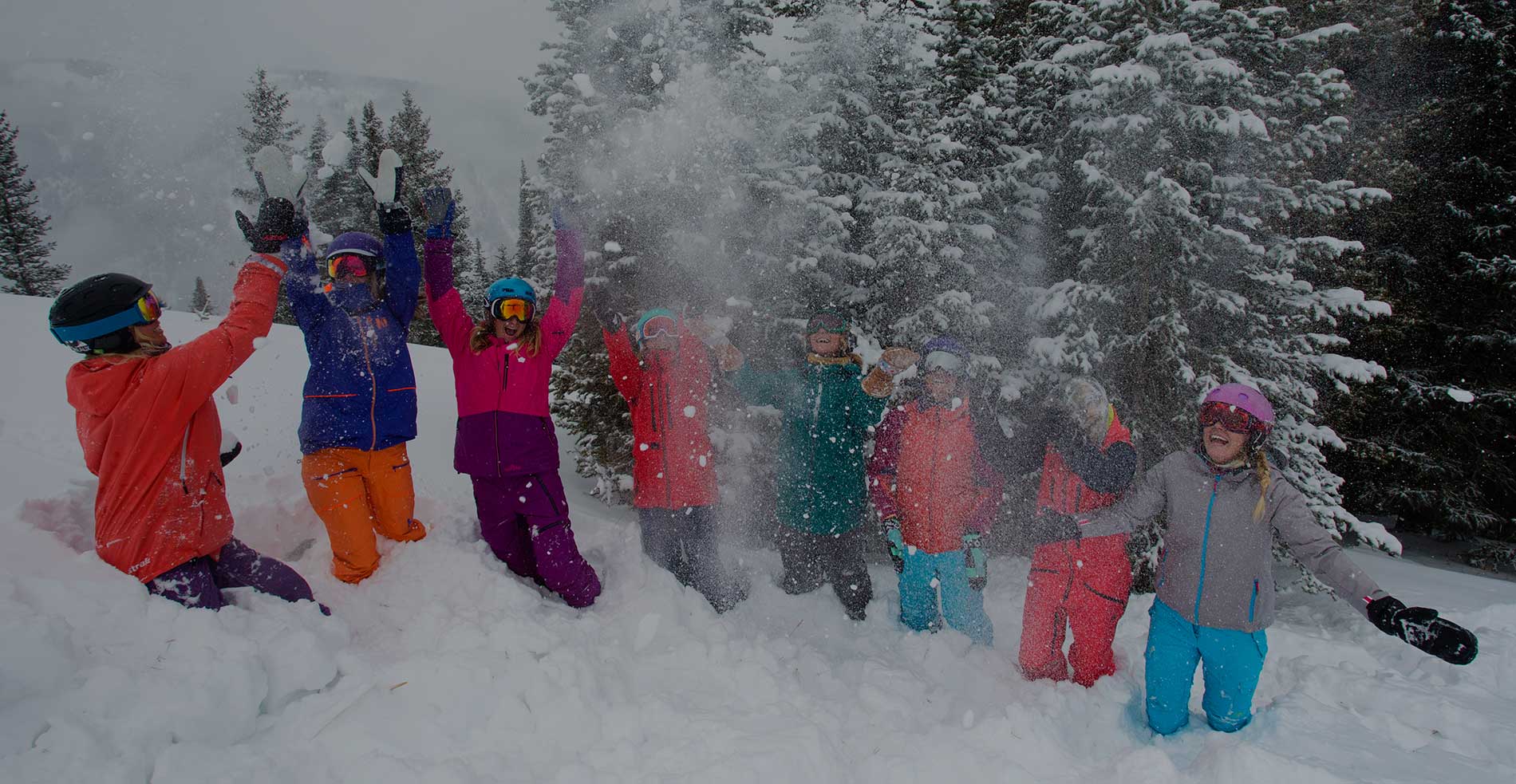
Celebrating Women's Day at Aspen Snowmass
About The Author

